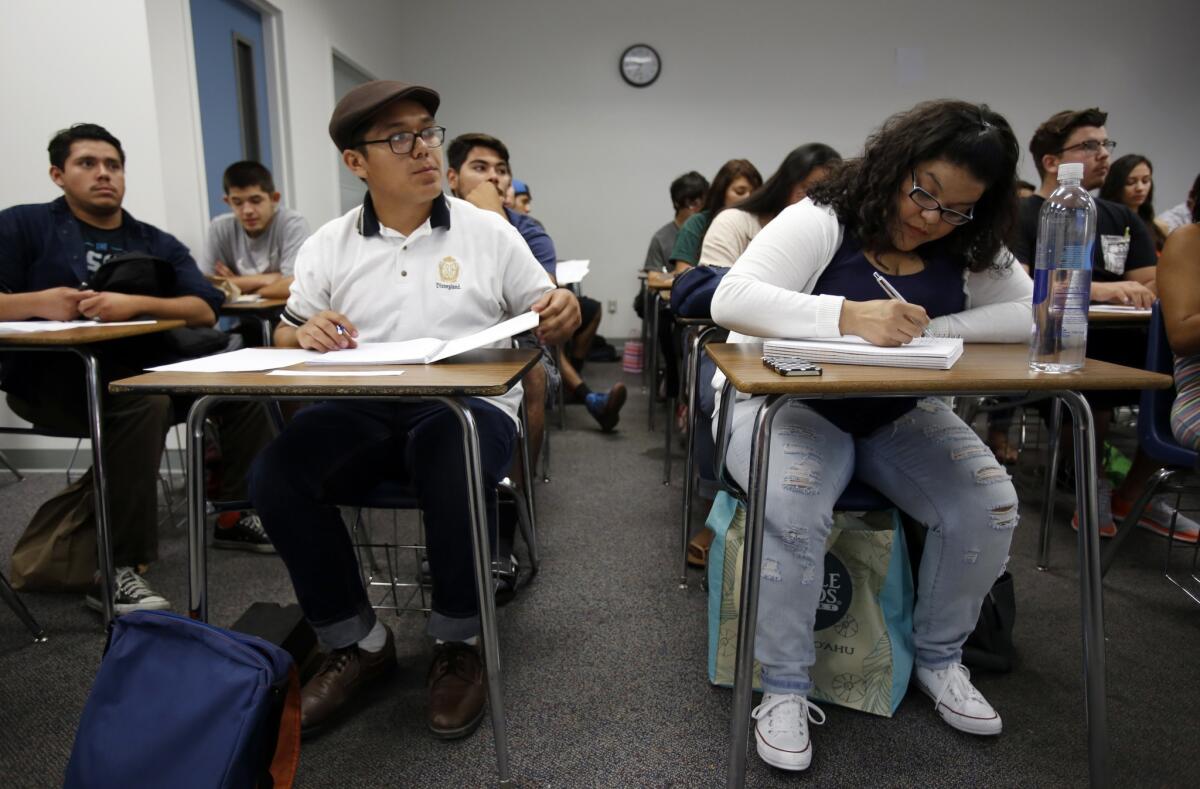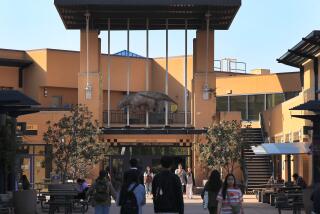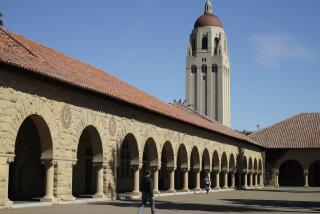Partnership clears path to law school for community college students

Jajaira Varela stood confidently in front of a classroom full of aspiring law students and belted out the empowering lyrics of Chaka Khan’s R&B classic “I’m Every Woman.” Some friends and family had always told Varela she wasn’t college material, so she dropped out of high school to be a singer. Now, the 25-year-old told her classmates, she’s ready to prove those naysayers wrong.
“They told me I was stupid, that I couldn’t do it and that I was an idiot for pursuing college,” she said. “I realized I don’t want to be a pretty voice. I want to make a difference.”
Varela decided to resume her education two years ago. She got her high school diploma and enrolled in Rio Hondo College in Whittier, where she is participating in a new program designed to steer community college students like her toward six state law schools. Few students from two-year colleges go on to law school, and administrators hope the program will boost racial and economic diversity at such campuses as Loyola Law School, USC and UC Irvine.
In 2012, 47% of Santa Clara University School of Law students were minorities. Nearly one in three of those identified themselves as Latino.
By contrast, nearly 70% of Rio Hondo students are Hispanic, according to the most recent state statistics.
“We think we can really increase the pipeline by preparing students for a professional path from the beginning,” said Marina Hsieh, a senior fellow at Santa Clara who helped develop the plan for the program.
Twenty-four community colleges and six California law schools are participating in the Community Colleges Pathways to Law School initiative, which is sponsored by the State Bar of California’s Council on Access and Fairness and run by school administrators. Under the agreement between the two-year colleges and the law schools, students will receive individual advising and mentoring, financial aid counseling, access to law school faculty, tutoring for entrance exams and a waiver of law school application fees.
They must complete seven required courses, including English composition and U.S. history, and two electives. They must also be accepted by one of the law schools’ undergraduate campuses. While participation in the program doesn’t guarantee law school admission, it will be noted on the students’ applications.
“That naturally will be considered as a factor in the admissions process,” said Chloe Reid, USC Gould School of Law’s dean of admissions.
Law firms generally don’t track whether their employees attended a community college, but Vicenta Arrizon Maffris, a former law firm recruiter for Los Angeles-based Gibson, Dunn & Crutcher who now teaches a pre-law course at Rio Hondo, said the number is probably small.
The obstacles for community college students are significant, Arrizon Maffris said. Seventy-five percent of California community college students must take remedial courses before taking classes for credit, which means it takes longer to complete their associate degrees.
A recent study found that about half of California community college students took four years to complete their degree.
During a recent public speaking exercise, Arrizon Maffris asked students in her class to bring objects that made them happy or sad and to explain why. One student brought pictures of her two young daughters and said she wanted to give them more opportunities. Another student cried as she held a photo of her brother and spoke about how his death affected her life. Many others said they wanted to be the first in their families to get a college degree.
Varela said she would like to help others as a defense attorney. She said she wants to attend Harvard Law School even though it’s not one of the schools in the program.
“Maybe it will expand,” she said.
jason.song@latimes.com
Twitter: @latjasonsong
More to Read
Start your day right
Sign up for Essential California for news, features and recommendations from the L.A. Times and beyond in your inbox six days a week.
You may occasionally receive promotional content from the Los Angeles Times.







